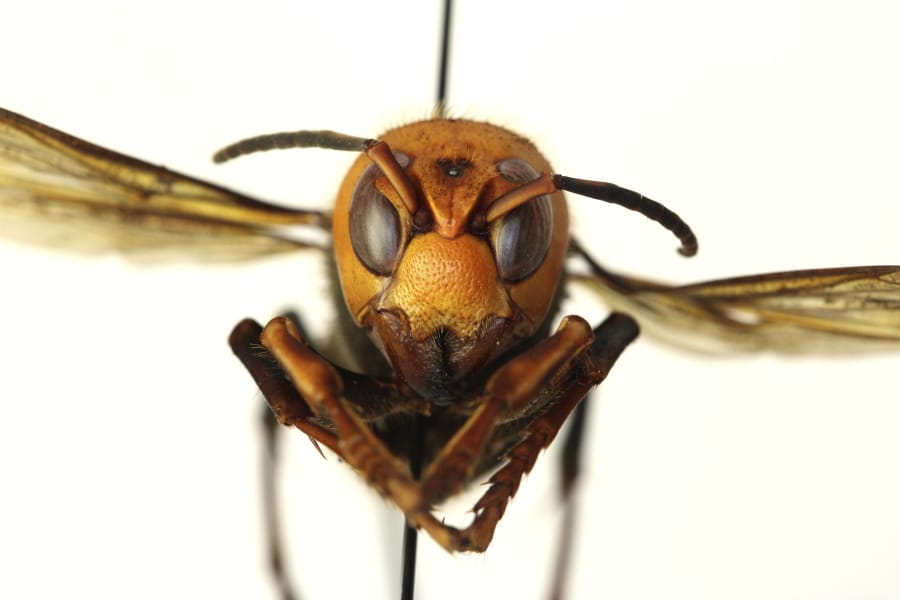BELLINGHAM — There’s some good news in the fight to keep the Asian giant hornet from making a home in Whatcom County and the rest of Washington state.
It turns out that the dead hornet found Wednesday, May 27, on a road near Custer, the first sighting of the year in Washington state, was a queen who had mated, according to the U.S. Department of Agriculture.
What’s good about that is this tidbit from Karla Salp, spokeswoman for the Washington State Department of Agriculture, who wrote in a post on Tuesday, June 2: “If she started a nest, it will not survive without her. This is effectively one colony down for 2020!”
The state agency is leading the effort to find and destroy the invasive Asian giant hornet, known for its painful sting when threatened and feared for the threat it poses to native honeybees and, by extension, the hundreds of crops in Washington state that the bees pollinate.
The Washington state Department of Agriculture and members of the Mt. Baker Beekeepers Association in Whatcom County started setting traps for the invasive pests early in spring after they were first seen in the county last year.
A Blaine-area homeowner found a dead one on his property on Dec. 8, 2019, and reported seeing a live one near a hummingbird feeder before it flew into a nearby wooded area.
Those 2019 sightings were the first of the invasive hornets in Washington state and the U.S.
Agriculture officials don’t yet know how widespread of a problem the hornets — now widely known as “murder hornets” after a recent New York Times article — are in Whatcom County or Washington state.
They believe the hornets established a colony somewhere near Blaine last year, according to a previous Bellingham Herald article.
About the size of an adult thumb, the Asian giant hornet, or Vespa mandarinia, is the world’s largest hornet and a predator of honeybees and other insects. They are identifiable by their large yellow/orange heads.
The state agency and the Mt. Baker Beekeepers set up experimental traps earlier in the spring to try to find and catch queens after they emerge from their winter homes in the ground.
The bulk of trapping will occur in summer, officials said, when the focus will shift to trying to find worker Asian giant hornets and tracking a live one back to the nest in order to destroy the colony.
State agriculture officials said that effort will start with 300 experimental bottle traps that will be placed in late June or early July in the Blaine and Custer area.
The invasive hornets’ native range is Asia. They also known as the Japanese hornet, yak-killer hornet and the giant sparrow bee.
The traps being set for Asian giant hornets are part of thousands being set statewide for more than 120 invasive pests and diseases, including the gypsy moth, apple maggot and Japanese beetle, according to a news release from the state Department of Agriculture on Monday, June 1.
State law gives the agency authority to trap for invasive pests on private property.
Still, trappers would try to get permission from property owners before hanging traps.
Because of COVID-19 concerns and physical distancing, traps will be placed this year without first contacting homeowners — what the agency called a “no knock” policy.
The agency’s trappers will wear safety vests with “WSDA” on the back.
People who want traps removed from their property before the end of the trapping season should call 800-443-6684.
Report it
If you think you’ve seen an Asian giant hornet, the Washington State Department of Agriculture wants you to report it. Here’s how:
• Go online to the Hornet Watch Report Form.
• Email PestProgram@agr.wa.gov.
• Call 800-443-6684.
• Stay updated at the Asian giant hornet watch Facebook group.
Learn more at agr.wa.gov/hornets, including how members of the public can create bottle traps for Asian giant hornets.



